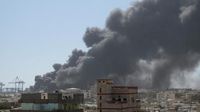The United Arab Emirates (UAE) has firmly denied allegations of supplying Chinese-made weapons to the Rapid Support Forces (RSF), a paramilitary group embroiled in a violent conflict with Sudan's military government. Salem Aljaberi, the UAE’s assistant minister for security and military affairs, took to social media on May 9, 2025, to refute claims made in a recent Amnesty International report, labeling them as "baseless" and lacking substantiated evidence.
Aljaberi's statement comes in the wake of a report released by Amnesty International on May 8, which asserted that RSF fighters had been documented using Chinese GB50A guided bombs and 155mm AH-4 howitzers during assaults in Khartoum and Darfur. According to Amnesty, the UAE was the only known buyer of these howitzers from China, as indicated by data from the Stockholm International Peace Research Institute.
In his response, Aljaberi emphasized that the AH-4 howitzer system has been available on the international market for nearly a decade and is not exclusive to the UAE. He characterized the Amnesty report as misleading and reiterated that the UAE does not supply weaponry to any party involved in the ongoing conflict in Sudan.
As the RSF has faced a series of military setbacks, it has ramped up drone attacks on areas controlled by the Sudanese army. Port Sudan, a critical hub for humanitarian aid, has been targeted for six consecutive days, with reports indicating that air defenses intercepted enemy drones. Witnesses have also described damage to vital infrastructure, including the country’s only operational international airport, its largest fuel storage facility, and the main power station.
The ongoing conflict in Sudan has resulted in tens of thousands of deaths and displaced more than 13 million people, leading the United Nations to declare it the world’s worst humanitarian crisis. UN Secretary-General Antonio Guterres has warned that the escalating attacks threaten to exacerbate humanitarian needs and complicate aid operations throughout the country.
In a related development, Sudan’s Defence Minister Yassin Ibrahim accused the UAE on May 6 of violating the country’s sovereignty by supporting the RSF, prompting the military government to announce a cut in diplomatic relations with Abu Dhabi. The UAE has rejected the legitimacy of Sudan’s internationally recognized government.
Earlier this week, the International Court of Justice dismissed Sudan’s lawsuit against the UAE, which accused it of involvement in genocide. The court ruled that it lacked jurisdiction over the matter due to the UAE’s exemption under Article 9 of the Genocide Convention. UAE official Reem Ketait welcomed the ruling, calling it "clear and decisive."
Amnesty International’s investigation has revealed that sophisticated Chinese weaponry, re-exported by the UAE, has been utilized by the RSF in blatant violation of the existing UN arms embargo. The organization identified the GB50A guided bombs and AH-4 howitzers as being used in attacks in Khartoum and Darfur, marking the first documented use of the GB50A bombs in any conflict worldwide.
Brian Castner, Head of Crisis Research at Amnesty International, stated, "This is clear evidence that sophisticated Chinese-made guided bombs and howitzers have been used in Sudan. The presence of recently manufactured Chinese bombs in North Darfur is a clear violation of the arms embargo by the UAE. Our documentation of AH-4 howitzers in Khartoum further strengthens a growing body of evidence showing extensive UAE support to the RSF, in violation of international law."
Castner criticized the UN Security Council for its inaction, stating, "It is shameful that the UN Security Council is failing to implement the existing arms embargo on Darfur, and not heeding calls to extend it to all of Sudan. Civilians are being killed and injured because of global inaction, while the UAE continues to flout the embargo. The UAE must halt its arms transfers to the RSF immediately. Until they do, all international arms transfers to the UAE must also stop."
China, as a state party to the Arms Trade Treaty (ATT), has been urged to take immediate measures to prevent the diversion of arms to Sudan. Amnesty International calls for a halt to arms transfers to the UAE until it can guarantee that none will be re-exported to Sudan or other embargoed destinations, and that all past breaches of UN arms embargoes are thoroughly investigated.
The RSF has been accused of committing widespread sexual violence, including rape and sexual slavery, against women and girls, which Amnesty International claims amounts to war crimes and possible crimes against humanity. The organization has launched a global petition urging the UN Security Council to extend the existing arms embargo beyond Darfur to the rest of Sudan, as part of its campaign advocating for civilian protection and accountability for atrocities committed against civilians.
In a separate incident on March 9, 2025, the RSF launched a drone strike near al-Malha town in North Darfur, reportedly targeting Sudanese Armed Forces (SAF), resulting in 13 deaths and several injuries. The remnants of the bomb used in the strike were identified as belonging to a Norinco GB50A guided aerial bomb, manufactured in 2024. The RSF has been using various Chinese drones, including the Wing Loong II and FeiHong-95, which have been provided by the UAE.
Amnesty International’s findings highlight the ongoing complexities and international implications of the conflict in Sudan, as well as the urgent need for a coordinated international response to address the humanitarian crisis and enforce existing arms embargoes. As the situation continues to evolve, the global community watches closely, hoping for a resolution that prioritizes the safety and rights of civilians caught in the crossfire.




